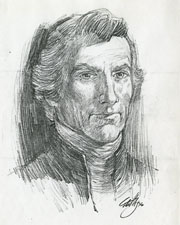John Williams Walker
John Williams Walker (born August 12, 1783 in Amelia County , Virginia , † April 23, 1823 in Huntsville , Alabama) was an American politician and represented the state of Alabama as the first elected US Senator . He belonged to the Democratic Republican Party .
Career
Walker attended the Willington Academy from Dr. Moses Waddel near Petersburg , Georgia , where he received his diploma in 1806. He then went to the College of New Jersey, now Princeton University , where he graduated in 1809. He then studied law and was admitted to the bar in Petersburg. Walker married Matilda Pope, daughter of LeRoy Pope and Judith Sale in 1808 . He then followed his father-in-law to the newly founded city of Huntsville in the Mississippi Territory (now Alabama) and began practicing as a lawyer there.
After the formation of the Alabama Territory in 1817, Walker served in 1818 as a deputy from Madison County in the first territorial parliament. In the second term of office he already acted as speaker. In 1819 he was chairman of the state constitutional convention that passed the first state constitution of Alabama, which allowed Alabama to join the United States. On October 28, 1819, Walker was elected almost unanimously by the state parliament as the first US Senator from Alabama. He held this office from December 14, 1819 until his resignation on December 12, 1822 because of his dwindling health. He died on April 23, 1823 in Huntsville, Madison County, Alabama. He was buried in Maple Hill Cemetery.
Honors
Walker County , Alabama, founded on December 20, 1824, was named after him.
family
Walker was the father of LeRoy Pope Walker , Secretary of War of the Confederate States of America and Brigadier General ; Richard Wilde Walker , Confederate Senator for the State of Alabama; Percy Walker , Alabama State Congressman; as well as some other children. He was also the grandfather of Richard Wilde Walker, Jr. , a judge on the Alabama State Supreme Court and the United States Court of Appeals for the Fifth Circuit.
Individual evidence
- ↑ Owen, 1716-1717. Owen gives a very detailed description of Walker's ancestors.
- ↑ Owen, 1716-1717.
- ↑ Owen, 1717; House Journal, First Territorial Session ( Memento of the original from April 5, 2006 in the Internet Archive ) Info: The archive link was automatically inserted and has not yet been checked. Please check the original and archive link according to the instructions and then remove this notice. , 4 ( Memento of the original from April 5, 2006 in the Internet Archive ) Info: The archive link was inserted automatically and has not yet been checked. Please check the original and archive link according to the instructions and then remove this notice. ; House Journal, Second Territorial Session ( Memento of the original from April 5, 2006 in the Internet Archive ) Info: The archive link was automatically inserted and has not yet been checked. Please check the original and archive link according to the instructions and then remove this notice. , 4 ( Memento of the original from April 5, 2006 in the Internet Archive ) Info: The archive link was inserted automatically and has not yet been checked. Please check the original and archive link according to the instructions and then remove this notice. .
- ↑ Foscue, Virginia O. (1989) Place Names in Alabama . Tuscaloosa: University of Alabama Press. ISBN 0-8173-0410-X
- ↑ Owen, 1717.
Bibliography
- Thomas McAdory Owen, History of Alabama and Dictionary of Alabama Biography . Vol. IV. Chicago: SJ Clarke, 1921. Reprinted with an introduction by Milo B. Howard, Jr. Spartanburg, SC: Reprint Company, 1978.
- Alabama Territory. Journal of the House of Representatives of the Alabama Territory , First Session, First General Assembly, February 1818 . St. Stephens, Alabama Territory: Thomas Eastin, 1818. Full text online at website of Alabama Legislature .
- Alabama Territory. Journal of the House of Representatives of the Alabama Territory , Second Session, First General Assembly, November 1818 . St. Stephens, Alabama Territory: Thomas Eastin, 1818. Full text online at website of Alabama Legislature .
- State of Alabama. Journal of the House of Representatives of the General Assembly of the State of Alabama , First Annual Session, 1819 . Cahawba, Alabama: State Press, 1820. Full text online at website of Alabama Legislature .
- Bailey, Hugh C. John Williams Walker: Life of the Old Southwest. University, Ala .: University of Alabama Press, 1964;
- Owsley, Frank L. "John Williams Walker." Alabama Review 9 (1956): 100-19.
Web links
- John Williams Walker in the Biographical Directory of the United States Congress (English)
| personal data | |
|---|---|
| SURNAME | Walker, John Williams |
| BRIEF DESCRIPTION | American politician |
| DATE OF BIRTH | August 12, 1783 |
| PLACE OF BIRTH | Amelia County , Virginia |
| DATE OF DEATH | April 23, 1823 |
| Place of death | Huntsville , Alabama |

